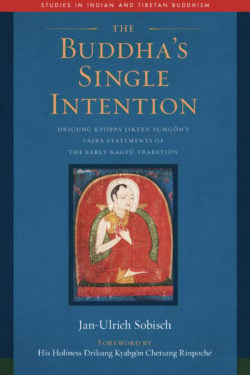Jan-Ulrich Sobisch

Jan-Ulrich Sobisch is on the faculty of the Center for Religious Studies at Ruhr-Universität Bochum. He studied Tibetology, Indology, and philosophy at Hamburg University from 1985 to 1992 with David Seyfort Ruegg, Lambert Schmithausen, and David Jackson, under whom he completed his dissertation on the three-vows literature. From 1994 to 1999, he was working under Albrecht Wezler for the Nepal-German Manuscript Preservation Project when he discovered and cataloged the complete thirty volumes of the writings of Amé Shab (1597–1659). From 2003 to 2016, he was a professor at the University of Copenhagen, during which time he published on the Hevajra Tantra and its associated Tibetan teachings in the Sakya school. For the past ten years, he has been focused on the unique Dgongs gcig tradition of the Drigung Kagyü school. In 2016 he received the prestigious Humboldt Research Award in recognition of his scholarly achievements. In 2022 he started with several colleagues in Bochum a Collaborative Research Center “Metaphors of Religion” that is projected for up to twelve years. His sub-project’s main focus will be on metaphors used in mahamudra instructions. Click here to learn more.
Books, Courses & Podcasts
The Buddha’s Single Intention
This book presents an influential and extraordinary teaching of the Kagyü tradition of Tibetan Buddhism known as the Single Intention by the master Drigung Kyobpa Jikten Sumgön (1143–1217), along with its chief commentaries, principally the Light of the Sun by Rikzin Chökyi Drakpa (1595–1659).
Early in the history of the Kagyü school, the teachings of Jikten Sumgön were condensed into 150 core formulations called vajra statements. These pithy, revelatory statements comprise the Single Intention (Dgongs gcig), which presents the thought of the Buddha and the nature of the ineffable (brjod du med pa) in concise and direct expression. The Single Intention weaves the thread of ineffable mahāmudrā through the entire fabric of Buddhism. It presents mahāmudrā as pervading disciplined conduct, meditative concentration, and discriminative knowledge; ground, path, and result; view, practice, and conduct; and the “three vows” of prātimokṣa, of the bodhisattvas, and of mantra. Jikten Sumgön teaches how the fundamental values and insights revealed by the Buddha are woven into reality and therefore accessible to all.
Jan-Ulrich Sobisch manages to convey the unity of the Buddha’s message both in its particulars and in its scope. His deep and authoritative skill makes this the definitive presentation of one of the most unique and compelling works of classical Tibetan literature.
Learn more about the Studies in Indian and Tibetan Buddhism series.

